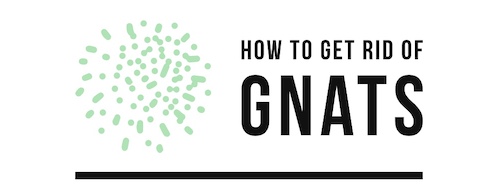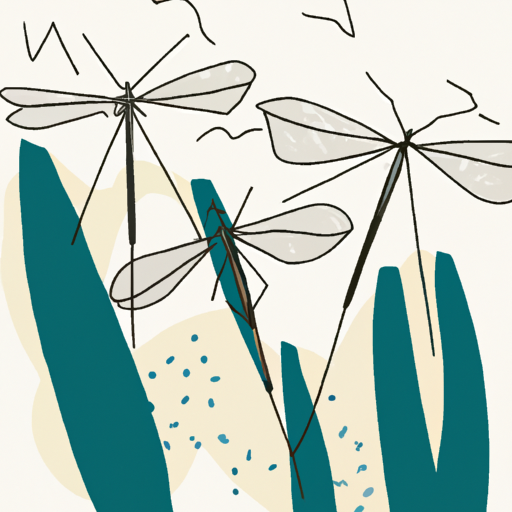How to Use Natural Repellents to Get Rid of Gnats in Your Vegetable Garden
Gnats can be a nuisance in vegetable gardens, but there are natural ways to get rid of them. Here are some tips on how to use natural repellents to keep gnats away from your vegetable garden:
1. Plant herbs and flowers that repel gnats. Certain herbs and flowers have strong scents that naturally repel gnats, such as basil, lavender, marigolds, and rosemary. Planting these around the perimeter of your garden can help keep the pests away.
2. Use essential oils as a spray repellent. Mix a few drops of essential oils such as peppermint or eucalyptus with water in a spray bottle and apply it around the perimeter of your garden every few days for an effective natural repellent against gnats.
3. Hang sticky traps near plants that attract gnats most often. Sticky traps are an easy way to catch large numbers of adult gnats before they lay eggs in your soil or on plants in your garden; hang them near areas where you’ve noticed the most activity from these pests (such as near fruit trees).
4. Introduce beneficial insects into your garden that feed on adult gnat populations like ladybugs or lacewings; these predators will help reduce their numbers over time without using any chemicals or pesticides which could harm other beneficial insects or pollinators in your area like bees and butterflies!
5. Keep compost piles far away from vegetable gardens; compost piles attract many types of pests including gnats so it’s best to keep them at least 20 feet away from any edible crops you may be growing nearby!
The Benefits of Introducing Beneficial Insects to Control Gnat Populations in Your Vegetable Garden
Introducing beneficial insects to control gnat populations in your vegetable garden can be a great way to reduce the number of pests that can damage your crops. Beneficial insects, such as ladybugs, lacewings, and parasitic wasps, are natural predators of gnats and other pests. By introducing these beneficial insects into your garden, you can help keep the population of gnats under control without having to resort to chemical pesticides.
Beneficial insects provide several benefits for controlling gnat populations in your vegetable garden. First, they are effective at reducing the number of adult gnats present in the area. Ladybugs feed on aphids and other soft-bodied pests that often attract adult gnats; lacewings feed on aphids and small caterpillars; while parasitic wasps lay their eggs inside pest larvae or eggs which then hatch into larvae that consume the host pest from within. All three types of beneficial insects will help reduce the number of adult gnats present in your garden by preying on their food sources or laying eggs inside them.
Second, introducing beneficial insects into your vegetable garden helps prevent future infestations by disrupting the reproductive cycle of any remaining adult gnats present in the area. Parasitic wasps lay their eggs inside pest larvae or eggs which then hatch into larvae that consume their host from within; this prevents any remaining adults from reproducing and further increasing their population size over time. Ladybugs also eat aphids which are a common food source for many species of adult gnat; this reduces both current and future infestations by limiting available food sources for these pests.
Finally, introducing beneficial insects is an environmentally friendly way to control pest populations without having to resort to chemical pesticides or other potentially harmful methods such as tilling soil or using insecticides directly on plants themselves. Beneficial insects do not harm plants directly nor do they have any negative effects on humans when used correctly; instead they simply prey upon existing pest populations while leaving desirable plants unharmed throughout the process – making them an ideal choice for organic gardening enthusiasts who wish to maintain a healthy balance between plant life and insect life within their gardens without relying heavily upon chemicals or other potentially hazardous methods for controlling pests like Gnats .
Overall, introducing beneficial insects is an effective way to reduce existing Gnat populations while preventing future infestations from occurring – all without having to rely heavily upon chemical pesticides or other potentially hazardous methods for controlling these pesky little critters!
How to Create a Barrier Around Your Vegetable Garden to Keep Gnats Out
Creating a barrier around your vegetable garden to keep gnats out is an effective way to protect your plants from these pesky insects. Gnats are attracted to moist soil and decaying organic matter, so it’s important to take steps to reduce the amount of moisture in the soil and remove any decaying material. Here are some tips for creating a barrier around your vegetable garden that will help keep gnats away:
1. Install a fence or trellis: Installing a fence or trellis around your vegetable garden can help keep gnats away by blocking their access. Make sure the fence or trellis is tall enough so that they cannot fly over it, and use fine mesh netting if possible.
2. Plant insect-repelling plants: Certain plants have natural insect-repelling properties that can help deter gnats from entering your garden area. Examples of these include marigolds, lavender, basil, rosemary, and mint. Planting these near the perimeter of your garden can create an effective barrier against gnats entering the area.
3. Use mulch: Mulching around the perimeter of your vegetable garden can also be helpful in keeping gnats away as it helps reduce moisture levels in the soil which attracts them less than moist areas do. Choose mulch made from wood chips or bark as this will provide better protection than other types such as straw or hay which may attract more insects instead of repelling them like wood chips do .
4 . Remove standing water : Standing water is another attractive source for gnat infestations , so make sure you remove any sources of standing water near your vegetable garden . This includes bird baths , buckets , old tires , etc .
Following these tips should help create an effective barrier against gnat infestations in and around your vegetable garden . Remember to check regularly for signs of infestation and take action quickly if you notice any activity .
Tips for Keeping the Soil Moisture Level Low and Preventing Gnat Infestations in Your Vegetable Garden
1. Water your plants deeply but infrequently. This encourages the roots to grow deeper into the soil, which helps them access moisture more efficiently and prevents shallow root systems that are prone to drying out quickly.
2. Mulch your garden beds with organic material such as straw, grass clippings or shredded leaves. This will help keep the soil moist and reduce evaporation from the surface of the soil. It also helps prevent weeds from taking over your garden beds and provides a habitat for beneficial insects that can help control pests like gnats.
3. Plant cover crops in between rows of vegetables or in areas where you don’t have any vegetables planted yet. Cover crops such as clover, rye grass or buckwheat will help keep moisture in the soil while also providing nutrients for future vegetable crops when they are tilled into the soil at a later date.
4. Avoid overwatering your plants as this can create an ideal environment for gnats to breed and thrive in wet soils with decaying organic matter present on top of it (such as mulch).
5 . Use row covers over vegetable beds during periods of high humidity or rainfall to protect them from excessive moisture levels that could lead to gnat infestations .
The Best Ways to Remove Standing Water and Reduce the Risk of Gnat Infestations in Your Vegetable Garden
Removing standing water and reducing the risk of gnat infestations in your vegetable garden is essential for a healthy and productive garden. Here are some of the best ways to do this:
1. Keep your garden free from debris: Remove any dead leaves, weeds, or other debris that can collect water and provide a breeding ground for gnats.
2. Make sure your soil is well-draining: If you have clay soil, consider adding organic matter such as compost or peat moss to improve drainage.
3. Install raised beds: Raised beds help keep water away from plants’ roots and reduce the risk of standing water in your garden.
4. Use mulch around plants: Mulch helps absorb excess moisture and prevents it from pooling around plants’ roots, which can attract gnats.
5. Water only when necessary: Overwatering can lead to standing water in your garden, so make sure you only give plants enough water when they need it – usually once or twice a week depending on weather conditions and plant type – rather than watering them every day or two regardless of need.
6. Use beneficial nematodes: Beneficial nematodes are microscopic worms that feed on pests like fungus gnats; they can be applied directly to the soil where they will seek out their prey and help reduce populations naturally without harming beneficial insects like bees or ladybugs that may also be present in your garden space..
7
Q&A
1. What are some natural ways to get rid of gnats in a vegetable garden?
A: Some natural ways to get rid of gnats in a vegetable garden include using yellow sticky traps, introducing beneficial nematodes, planting certain herbs and flowers that repel gnats, and using diatomaceous earth.
2. How can I prevent gnats from coming back to my vegetable garden?
A: To prevent gnats from coming back to your vegetable garden, make sure you keep the soil moist but not overly wet, remove any decaying plant material or debris from the area, use yellow sticky traps or other insect traps around the perimeter of your garden, and introduce beneficial nematodes into the soil.
3. What plants can I plant in my vegetable garden that will repel gnats?
A: Plants that can be planted in a vegetable garden to repel gnats include marigolds, basil, lavender, rosemary and mint. These plants have strong scents which help deter pests like gnats away from your vegetables.
4. Are there any chemical treatments available for getting rid of gnats in a vegetable garden?
A: Yes there are chemical treatments available for getting rid of gnats in a vegetable garden such as insecticides containing pyrethrin or permethrin which should be applied according to label instructions for best results. However it is important to note that these chemicals may also kill beneficial insects so it is best used as a last resort if other methods fail first.
5. Is it safe for me and my family if I use diatomaceous earth on my vegetables?
A: Yes it is safe for you and your family if you use diatomaceous earth on your vegetables as long as you follow all safety instructions when applying it such as wearing protective clothing like gloves and goggles when handling the powder form of this product
Conclusion
In conclusion, getting rid of gnats in a vegetable garden can be done with a combination of cultural practices and chemical treatments. Cultural practices such as removing debris, keeping the soil moist but not wet, and using mulch can help reduce the number of gnats in your garden. Chemical treatments such as insecticides and nematodes can also be used to control gnat populations. With proper management, you should be able to keep your vegetable garden free from pesky gnats.

